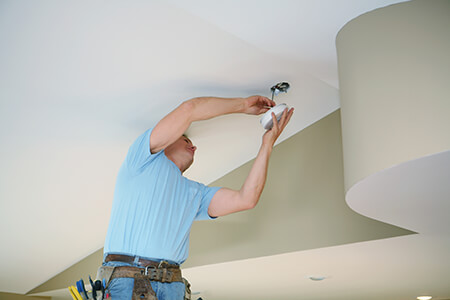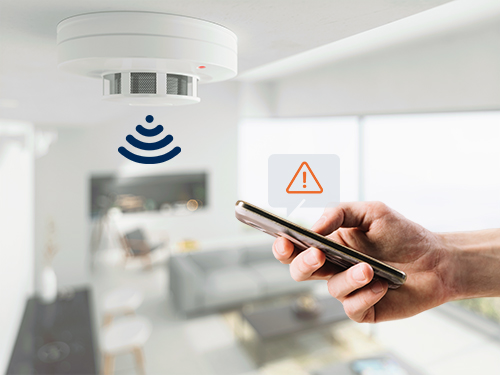The Benefits Of Wireless and WiFi Communicating Smoke & CO Alarms
Part of maintaining a comfortable home is having the right safety devices in place to help safeguard you and your home. With the holidays just around the corner, one of the best gifts you can give yourself and your family is the certainty that your home is being vigilantly watched for signs of smoke and the dangerous product of combustion, carbon monoxide gas. Properly functioning smoke alarms and carbon monoxide detectors help ensure your safety and could potentially save your life.
Important Things To Know About Your Smoke and CO Alarms
 As with any device you rely on to keep you safe, it’s important that you understand the operation and maintenance requirements of your smoke and carbon monoxide alarms. With effective lifespans of 10 years for most common smoke alarms, and 7 years for carbon monoxide detectors, ensuring that your devices are replaced within that range is the best practice. We regularly visit homes that have alarms far beyond those ages.
As with any device you rely on to keep you safe, it’s important that you understand the operation and maintenance requirements of your smoke and carbon monoxide alarms. With effective lifespans of 10 years for most common smoke alarms, and 7 years for carbon monoxide detectors, ensuring that your devices are replaced within that range is the best practice. We regularly visit homes that have alarms far beyond those ages.
The peace of mind that you’ll be accurately informed at the first signs of potential danger depends on a fully functioning device. Manufacturers recommend that you test each device monthly and replace batteries annually, so you can be sure that each alarm is working reliably. Thoroughly reading the owner’s manuals and keeping them in a handy place where you can refresh your memory periodically should be a standard practice.
A brief word on terminology: Technically speaking, as far as our suppliers and manufacturers are concerned, smoke ‘detectors’ are actually a commercial sensing product that’s connected to an extensive central monitoring and alarm system, while smoke ‘alarms’ are the residential products that most of us are all accustomed to. In practice, the terms have become interchangeable. ‘Nuff said!
Is now the time to replace my smoke alarms and CO detectors?
Safety Alarms ‘Talk’ To Each Other
 For many years, residential code has required that all smoke alarms in a home be interconnected, or ‘hardwired,’ so that if one alarm is set off, all smoke alarms in the residence are activated – the safest approach. This interconnecting of devices had previously required actual hardwiring, with an electrician running wires throughout the home connecting each device in a single network. With wireless smoke and CO alarms, this is no longer the case.
For many years, residential code has required that all smoke alarms in a home be interconnected, or ‘hardwired,’ so that if one alarm is set off, all smoke alarms in the residence are activated – the safest approach. This interconnecting of devices had previously required actual hardwiring, with an electrician running wires throughout the home connecting each device in a single network. With wireless smoke and CO alarms, this is no longer the case.
A Variety of Options
Some of the more popular options for home smoke and CO alarms include basic wireless units that communicate with each other inside your home, WiFi-enabled wireless models that can also notify you remotely on your smartphone if an alarm is activated, and combination alarms that house both smoke and carbon monoxide detection in the same unit.
Major Benefits of Wireless Smoke Alarms
- Simple interconnection when replacing all alarms and expanding coverage
- Easy installation, with no need for new wiring
- Great for adding alarms to homes that have no existing protection
- WiFi models can send alarms to your smartphone when a device is triggered
Denver-Boulder Electrical Services
If you have any questions, or would like to get a free, low-pressure quote to replace or add new smoke or carbon monoxide alarms to any area of your home, in the Denver-Boulder area, contact the  highly skilled electricians at Save Home Heat Company. Our team is here to answer any and all of your questions in a low-pressure, informative manner, so you can make decisions you’ll feel comfortable with.
highly skilled electricians at Save Home Heat Company. Our team is here to answer any and all of your questions in a low-pressure, informative manner, so you can make decisions you’ll feel comfortable with.
Please contact me about installing new smoke alarms and carbon monoxide detectors in my home!




